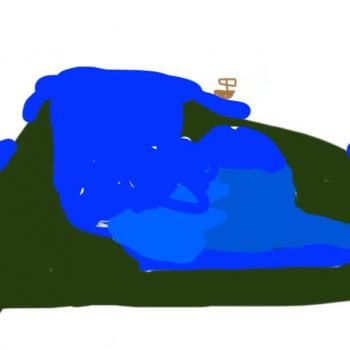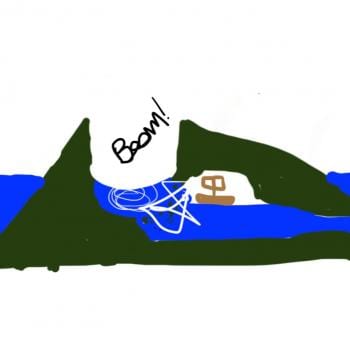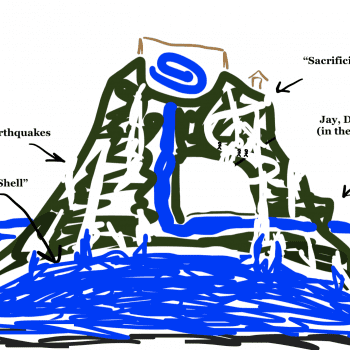Escape from the Island of Aquarius, pp. 17-25
After bringing their boat close enough that they can step out into “shallow” water, the Coopers disembark.
Dr. Cooper let Jay and Lila go ahead so he could keep watch from the rear, and away they went in single file.
Good thinking.
Darkness and an ominous silence surrounded them as they followed that big man with the bright burning torch on his head, the torch casting long shadows that danced far back among the trees.
That last bit isn’t bad, as writing goes.
It’s evening, so they’re traversing in the dark. This means that when they come to a rope bridge they can hear, but not see, water far below. Lila balks.
“Oh, no! I can’t go over that!”
Someone noted last week that while Peretti makes Lila the scared and nervous one because she’s the girl, this sometimes has the side effect of making her seem like the only sane of the bunch. In situations that are genuinely dangerous, when Dr. Cooper is asking his children to do things that are legitimately a bad idea, Lila is the one who says what everyone else really ought to be saying.
Quick side note—when Peretti described the path they’re following as “primitive” I decided not to remark on that, but he describes the ropes of the road bridge as “primitive” as well. In what sense are these ropes primitive? The fact that Paretti is repeatedly using this word, after describing a Polynesian man as “primitive” in the previous chapter, in a book set in the South Pacific, is surely not coincidental.
Anyway, Jay and Dr. Cooper have a back and forth about how odd the sound of the water is. They think it sounds like a waterfall, but somehow different. I’ll go ahead and tell you: it’s a whirlpool. Does anyone know what a whirlpool sounds like? Because I didn’t. So I googled it and the answer appears to be … pig noises. I’m reading that whirlpools sound like the grunting of a pig. Huh. Interesting.
Here’s how the noise is described in the book:
From somewhere came a deep, throaty, gargling roar of water.
And then later:
The sound was very strange, not like the usual dashing, splashing sound of a river, and not like the usual crashing and thundering of a waterfall.
They aren’t able to figure it out. A pig sound actually makes sense, now that I think about it—a sort of sucking. Is that what they’re actually describing? I’m not sure. Anyway! There’s a whirlpool!
Dr. Cooper adds this as they cross:
“They say that Adam MacKenzie drowned, even though he was an excellent swimmer…” Dr. Cooper said thoughtfully.
Say what now? The story is that MacKenzie is missing. There’s also a story that no one returns from the island of Aquarius. Where exactly did this story that MacKenzie drowned come from all of a sudden?
So anyway, they make it across.
If we have any geologists here, especially anyone who specialize in volcanic activity or volcanic islands, this book will get very interesting—and confusing—later on. When we get there, I’d love to have some expert input in the comments section! For example, can a caldera have a whirlpool in it? I’m guessing not, but then what do I know! Maybe there can! Why am I asking? No reason! Spoilers!
They keep following the Polynesian and ultimately come to a village.
Just wait! This is going to be good.
They rounded a corner, and the trail became a road that led them into a rather quaint village of small cottages and bungalows with a definite, civilized American flavor.
Civilized.
The homes were well-built, with durable slate roofs, front porches, and even a few porch swings. They had glass windows, hinged doors, real welcome mats, clotheslines, and electric lights. The Coopers saw people of all ages, working, playing, resting, talking. But these people were not Polynesians. They were civilized Westerners.
Civilized.
Civilized Westerners no less.
I mean if he’s going to overuse the word primitive I guess it’s only par for the course that Peretti would overuse the word civilized too. Just, ugh. This book is not shy!
But also, but where did all this stuff come from? How is the electricity run? A generator? Where does the fuel come from? If the story about this island is that no one ever returns then there must not be any trade, any stocking up trips or refueling missions. What, did all these people travel here with glass windows and 5,000 gallons of diesel fuel strapped to their backs? Also, taking all this stuff here, even if it was all brought in on the first haul, would make quite a splash. Someone would know about it.
“Are you sure we haven’t come sure somewhere in Ohio?” Jay asked his father and sister.
Ha. Hahaha. Ha.
Dr. Cooper was visibly surprised. “This is certainly not the kind of village I expected to find on a remote South Sea island. It must be some kind of … colony.”
Ding! Ding ding ding! A broken clock really is right twice a day!
I mean really, let’s call a colony a colony. Let’s not pretend westerners traipsing around like this are doing anything other than colonizing the places they invade and settle like this. I mean, really.
But actually it’s a cult.
They passed one little house with a woman and two children sitting under the porchlight in the cool of the evening. The woman wore the now-familiar Aquarius medallion around her neck. Dr. Cooper waved and said hello. She waved back but said nothing.
Three carpenters were relaxing around a small outdoor table and laughing loudly. When the Coopers came by the men immediately fell silent, staring vacantly as the strangers passed.
The Coopers said good evening, but again they got no answer. Identical copper medallions hung around every man’s neck.
See? They’re acting weird!
No, seriously, though. Think Jonestown. Except I don’t think they wore necklaces in Jonestown. Matching necklaces seems like it might be an early tip-off and prevent recruitment. Then again, there was that cult in Oregon. The one where they all wore some shade of red or orange.

So, okay. I’ll buy the necklaces.
The big Polynesian stepped onto the veranda and rang a very loud brass ship’s bell. Women, men, children, youths, and elders from all around the square began to gather, staring at the Coopers with great curiosity and a little grimness. After a short moment the door of the cottage opened and a man stepped out. He spoke to the Polynesian and then turned his gaze on the three unknowns.
I could split hairs, but—okay fine, I’ll split hairs. Is the bell supposed to signal the people to assemble, or signal their leader that someone needs to meet with him? It seems like maybe both? But in that case, is anyone allowed to call an assembly? The unnamed Polynesian they’ve been following doesn’t have any position of leadership in the group. This isn’t some sort of non-hierarchical cult, either.
About the man who came out of the cottage:
He was middle-aged, strong looking, with graying hair, piercing eyes, and a very impressive air of authority. A very ornate copper medallion dangled from his neck.
He just stands there and stares at them with “a cold expression” on his face. Finally, he says:
“Welcome to the Isle of Aquarius. Who are you, where do you come from, and what brings you here?”
Notice that he does not introduce himself. He does not give them a name. This will become important later. As in, in just a minute.
Dr. Cooper explains who they are, which is how we learn that Dr. Cooper is the head of “Cooper Incorporated, an archeological research firm.” I just reread Trapped at the Bottom of the Sea, and in that book we learn that Dr. Cooper is a professor. I’m really not sure how all of this fits, except that maybe in the first two books Dr. Cooper is an independent researcher and then in book three Peretti realizes he actually wants him to be a professor. That’s my guess, at least.
Anyway, Dr. Cooper says he’s looking for Reverend Adam MacKenzie of the International Missionary Alliance. Things are about to get awkward.
The man exchanged just the quickest little glance with some of the gathered people and then he broke into a smile, something he had not seemed capable of.
I think we’re supposed to be gathering that this is all shady as heck.
Which, yeah.
The slight smile on the man’s face faded quickly as Dr. Cooper told about the dead man on the primitive raft.
And that’s number three! Everything’s all primitive in this book!
Dr. Cooper produced a photograph. Several people gathered to look at it, and then gasped and muttered.
“Tommy!” They said. “It’s Tommy!”
The man looked at the picture and scowled, shaking his head.
“Tommy was our nickname for him,” he said mournfully. “He was a very sweet person. We all loved him.”
Um, what? Why is it important that that’s a nickname? “Yeah, that’s Bill. That is, Bill was our nickname for him,” said no one ever. Seriously, no explanation needed. It’s Tommy.
Here’s the thing: dude is a cult leader. For everything Peretti does badly, I feel like he’s portraying this fairly well. I mean, sure, he’s being a bit awkward about it. It feels a bit clumsy. But I know enough about Jonestown, and Waco, and Rajneeshpuram in Oregon, to be totally onboard with this portrayal.
“Do you have any idea how he ended up adrift and dead in the middle of the ocean?” Dr. Cooper asked.
“He was alive when he left here on that raft,” said the man, “But his death is certainly no surprise. it may be hard for you to understand, not having lived here in this place, but …” The man raised his voice as if he wanted all the people to hear. “There are very powerful energies still at work on this island, created by ancient traditions. The more primitive observer would call it—forgive me—magic. At any rate, we still encounter these forces from time to time, and one such manifestation is the terrible madness, an inescapable curse that sometimes besets people here. The native word is Moro-Kunda; it means the Madness Before Death. It has no known cause, no known cure, and it is always fatal.
That is the fourth use of the word “primitive” in one chapter.
I’ll spoil something for you—the madness is caused by the bite of a fly this guy brought with him from elsewhere, that he he is using to cause madness in those who turn against him, to keep everyone else in line. I don’t know of any cult leaders who ever used something quite like this to control their followers, but I’ll go for it—cult leaders are nothing if not manipulative. Cult leaders also need to control their followers, and convincing them that anyone who starts doubting goes mad sounds pretty effective.
One woman who survived Jonestown because she was transferred to the group’s Georgetown office Jones wanted his most dedicated supporters there to meet the congressional delegation. Good cult leaders are manipulative. That’s how they get and keep a following. The amount of energy that goes into keeping one’s followers, and preventing them from leaving or questioning by whatever means necessary, can be enormous. It’s unsurprising that the cult leader in this book would be up for underhanded tactics, especially given that he’s already isolated his followers by bringing them here.
Here’s something to bear in mind, though—if the madness is induced by a fly brought to the island by this leader, his story about a native tradition of “Moro-Kunda” is completely invented. While I reread this book before starting this review series, I can’t remember whether Peretti realizes this.
Peretti keeps using the word “primitive,” and not ironically. Given that, does he realize that what’s going on here has nothing to do with the “primitive” traditions of the native groups? Does he realize it instead has everything to do with a white westerner inventing primitive traditions to suit his own purposes, and benefiting from white westerners’ racism, which renders them particularly credulous to the wildest fictional story if you use words like “ancient traditions of primitive native tribes”?
This story is not an indictment of native tribes so much as it is an indictment of white westerners’ racism and the way they view native tribes, but I don’t think Peretti realizes that. (I just reread Trapped at the Bottom of the Sea, which is also set in the Pacific, and let me just say that based on that, I don’t think Peretti gets what he’s actually doing in this book. I kid you not, in that book there’s a tribe of cannibals, and there’s a (white, western) missionary in that story too, and the whole portrayal is just so gross.)
So! Moro-Kunda is a curse this white western cult leader invented to control his followers and make sure they don’t question him or leave. And they really can’t leave, anyway, because when Tommy tried to leave the only way he had to do that was on a hastily constructed raft.
Anyway, back to cult leader:
“This curse fell upon Tommy. He went mad, and though we tried to stop him, he fabricated that crude raft and fled from the island.” The man paused dramatically and then added, “But he couldn’t escape Moro-Kunda.”
Okay. Great. Nice spin. (We’ll learn later that the deadly madness-causing fly was planted on Tommy before he left, maybe in his belongings, because of course it was.)
Dr. Cooper asks about the note in Tommy’s pocket, in MacKenzie’s handwriting. He says it seemed to be a call for help, and cult leader starts laughing as though he’s amused. Dr. Cooper is not impressed.
“Well,” Dr. Cooper tried to explain, “MacKenzie was thought to be dead. Drowned.”
Again, why drowned?
“But now this note could be proof that he’s still alive somewhere…”
“Oh, he is definitely alive, Dr. Cooper!”
Dr. Cooper exchanged glances with Jay and Lila, and asked, “Then … you know this MacKenzie?”
“Quite well.”
“Do you know where we can find him?”
“You have found him,” said the man with a smile. “I am Adam MacKenzie!”
Lila chuckled. “Well, that was easy!”
Lila is all of us.
Dr. Cooper is a bit suspicious, though. And all of a sudden I have a major question. Has he never seen a picture of MacKenzie? I feel like if I were sending someone to look for a missing person one of the first things I’d do is give them a picture. I get that this is the 1980s, and they didn’t have smartphones, but they did have cameras and they did have pictures, and I know because I saw those kids’ pictures on milk cartons when I was a kid. Also, he has MacKenzie’s handwriting. Couldn’t he just ask for a sample?
At this point Peretti starts referring to the cult leader as MacKenzie, but I’m going to use Fake MacKenzie instead. Just because. Fake MacKenzie says he must have written the note “ages ago” and “somehow it got misplaced.” This makes very little sense, especially when he adds this:
“I gave it to Tommy to send through the U.S. Post Office in Samoa. He must have forgotten, and was carrying it in his pocket all this time!”
Wait what now? Why would he give it to Tommy to take to the post office if no one ever leaves the island (remember, the story about how no one who goes to the island ever comes back)? And the one person he asked to take the letter to the post office just happened to be the same person who left the island on a homemade raft, and he just happened to have the letter—which Fake MacKenzie says sung the praises of the island and his success there—in his pocket? Sure!
Now, mind you, I don’t think we’re meant to find this story all that convincing. We’re told Dr. Cooper “forced a smile” after Fake MacKenzie told him all this. But still, come on! This is just so obvious. It seems like the best thing for Dr. Cooper to do is to leave as soon as possible, without saying anything contrary of Fake MacKenzie, and notify the authorities that something weird is going on.
Because it very clearly is.
As for Fake MacKenzie, he’s more interested in singing the praises of the island than anything else.
“Where one might expect a remote, untouched island with a very primitive culture at best, one finds instead a beautiful new world, a bold new civilization, a literal heaven on earth!”
My god, there’s that word again—for a fifth time.
He turned to the big Polynesian. “Candle, take the Coopers’ packs and belongings into the guest hut. They can stay with us tonight and get a fresh start back in the morning!”
Yes. Do that. Sleep there and then get.
Dude, this is all happening after Jonestown, and Dr. Cooper has his kids with him. Surely he remembers what happened to the congressional delegation that came in to check things out. Bad things. This is very clearly a potentially dangerous situation, and you’re there alone, with two children. Leave!
“Oh, and Candle…” said MacKenzie, “I think you can extinguish that thing now.”
Candle took a tall hat from his belt and put it on, snuffing out the torch.
WTAF.
“He’s still rather primitive,” explained MacKenzie. “Even though we now produce our own electricity, he can’t give up his old, traditional means of lighting his way.”
Alright, but who started calling him Candle? I am pretty damn sure that’s not his name, and I’m also pretty damn sure he has an actual name. Would using his actual name be so hard?
I mean I get that Fake MacKenzie is the bad guy here, but I don’t get the feeling Fake Mackenzie’s calling this poor man “Candle” was inserted into this story as some sort of indictment.
Ugh.
“Oh, and Doctor…” MacKenzie gave Dr. Cooper’s gun a raised eyebrow. “If our people seem a little alarmed at your presence, it could be because of your weapon. We have no weapons here. This is an island of perfect peace.”
This sent me back to the previous chapter for a description of the gun, where I found this: “Dr. Cooper reached for his 357 revolver and buckled it on.” So he’s wearing it bucked around his waist, and presumably isn’t wearing a jacket over it or anything. That at least makes more sense than him carrying it around in his hands, which is what I first thought when Fake MacKenzie mentioned it.
Finally, we get an ad for the commune:
MacKenzie looked around the square, pointing out particular faces as he said, “These are people from all walks of life, from lawyers to doctors, from carpenters to college professors. They came from America, from Great Britain and Australia. Some are from France and Germany. All share in our dream, Doctor.”
I’m sensing a theme here: they’re all from western countries. Mostly anglophone, plus France and Germany in western Europe.
“Which is?”
“Our own brand-new world, a place free from crime, war, bloodshed, and greed. We’ve left the old world behind, we’ve escaped the rat race, and now we are building a new world for ourselves. Let me show you around!”
This really feels very Jonestown, except that it lacks Jonestown’s focus on racial justice.
MacKenzie gave them a tour of the village, form one end to the other.
“See here?” he said, pointing this way and that. “We have our own water system, sewer system, and electric power. It took years of backbreaking work, but we accomplished it.”
Did you know that Jonestown was never self sufficient? I didn’t until recently! They weren’t even able to produce enough food to feed everyone there. So color me skeptical of all of this.
Here’s a question: if they have a functioning sewer system, where did they get the piping? Remember, first, that no one off island knows this group is here; and second, there’s a story that no one who goes to the island ever comes back. These both mean that there isn’t any trade going on. So where did the sewer pipes come from? They can’t just make their own plastic or smelt their own metals.
And what does having a water system mean? Running water? Same problem as above—where did they get the pipes, the faucets, even the sinks? And the glass windows? Pretty sure they don’t have a glass blower. Slate roofs? Had to come from somewhere!
Look, there are two options: live like the native population does (which I think in this case would mean living in dwellings constructed of materials available on the island), or import western style materials. Native groups that live in traditional villages aren’t sitting on ironworks and plastics factories and just not using them. You can’t import enough piping for a sewer system, and material for slate roofs and glass windows and an entire electric power system (whatever that means) without people outside the island knowing you’re there, which is what Peretti wants us to believe is going on.
Just, no.
“The sign of Aquarius is an international symbol for a coming age of world peace. We are realizing that right here, right now.”
I have no idea whether this is based in any sort of reality or not, but I do know that Dr. Cooper follows this up by asking where there church is, because that is of course the most important question to ask here. Fake MacKenzie says they talk about spiritual matters in their meeting house.
Okay, I’m done. For this week, that is.
I have a Patreon! Please support my writing!










